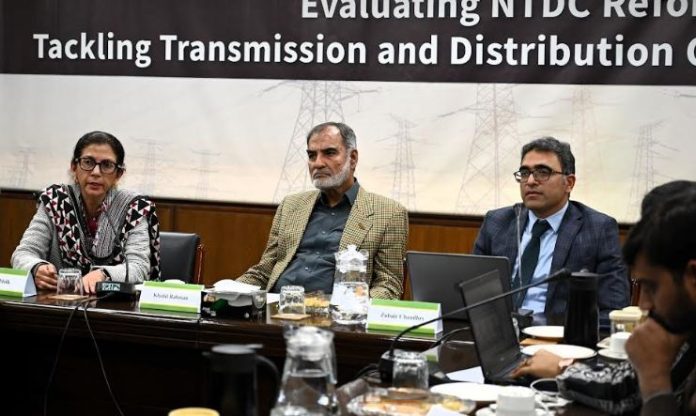ISLAMABAD, FEB 21: /DNA/ – While the NTDC’s structural reforms are designed to improve accountability, efficiency, and transparency, their success depends on comprehensive planning, political neutrality, and systemic coordination, as mere restructuring alone will not bring lasting improvements. The success of these reforms also needs reducing bureaucratic influence, ensuring independent decision-making, and prioritizing national interest over institutional inertia.
This perspective was shared by power sector experts during a roundtable on “Evaluating NTDC Reforms: Tackling Transmission and Distribution Challenges in Pakistan,” held at the Institute of Policy Studies (IPS), Islamabad.
The session was addressed as keynote speaker by Dr Fiaz Chaudhry, chairman National Transmission and Despatch Company (NTDC), Zubair Chaudhry, general manager finance, Central Power Purchasing Agency (CPPA), Afia Malik, senior energy policy expert, Pakistan Institute of Development Economics (PIDE), and Khalid Rahman, chairman IPS. It was chaired by Mirza Hamid Hassan, former federal secretary, Water and Power, and moderated by Ameena Sohail, an energy lawyer, whereas Ashfaq Mehmood, former secretary, Water and Power, also shared his views.
Providing an overview of the NTDC reforms, Fiaz Chaudhry noted that reforms are primarily focused on structural changes. He said restructuring included separating the project development function into an independent Energy Infrastructure Development & Management Company to insulate it from existing institutional inefficiencies. It also includes renaming NTDC to National Grid Company of Pakistan (NGC-Pak) to improve the efficiency and effectiveness of transmission service delivery. Additionally, forming an Independent System and Market Operator would ensure neutrality and avoid conflicts of interest.
These reforms were needed as persistent internal and external factors, including weak corporate boards, ineffective governance, disregard for corporate policies, complex procurement processes, and arbitrary decision-making, have been undermining NTDC’s performance, he noted.
Talking about the future outlook of NTDC, Zubair Chaudhry observed that reform initiation is a time-intensive process but promises several critical advantages, including enhanced accountability by segregating responsibilities so that each entity will be directly accountable for its specific functions. It will also ensure timely project delivery as independent companies will face direct consequences for delays, improving overall performance. Additionally, the reforms would introduce transparency and efficiency in allocating funds, particularly for transmission infrastructure development.
He underscored that it is crucial to understand the broader perspective of Pakistan’s power sector, as any financial burden or inefficiency within this sector ultimately impacts consumers through increased tariffs or adds to the national fiscal burden. Therefore, a clear awareness of both the technical and commercial flows within the power sector is essential to reap these advantages.
Referencing her earlier study on NTDC reforms, Afia Malik pointed out that there are systemic inefficiencies beyond these challenges. She stressed that leadership issues, bureaucratic interventions, and inadequate human resource capacity are primary barriers to progress in the power sector. She also underscored governance incompetence within NTDC and other power sector boards, attributing it to excessive political influence and non-independent decision-making.
She stressed the necessity of coordination across all entities, warning that even with structural separation, collaboration would still be required to see any tangible improvements. To improve efficiency, she advocated for the adoption of advanced technologies and the implementation of export-competitive tariffs to support industrial growth.
Adding to this, Hamid Hassan asserted that mismanagement and confusion in the power sector cannot be resolved by focusing on isolated issues. He stressed that flawed government planning remains a fundamental issue, and restructuring efforts would be ineffective without comprehensive reforms in all domains of planning, coordination, operation, and regulation.
In concluding remarks, Khalid Rahman noted that issues in the power sector are not isolated but linked to broader poor governance, including institutional and political crises. He attributed the discussed challenges to a deeper moral crisis at both leadership and grassroots levels, underscoring the need for prioritizing collective interests and systemic reform beyond superficial restructuring.

















